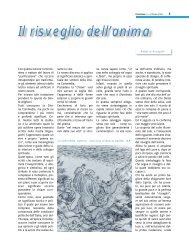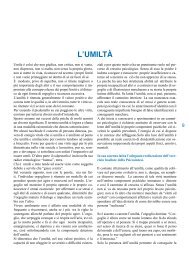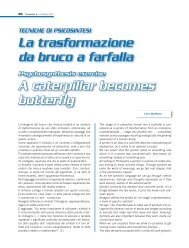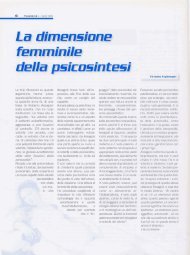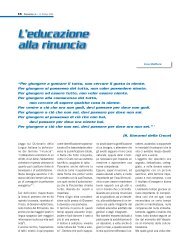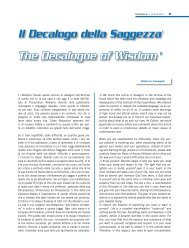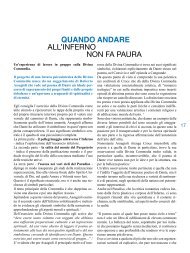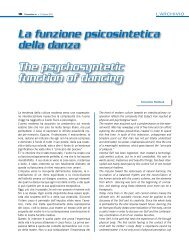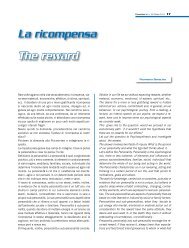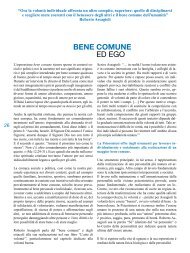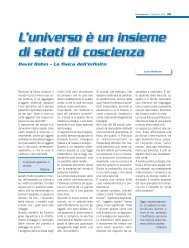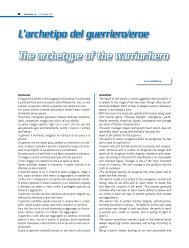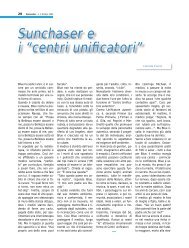Piermaria Bonacina - La solitudine.pdf - Istituto di psicosintesi
Piermaria Bonacina - La solitudine.pdf - Istituto di psicosintesi
Piermaria Bonacina - La solitudine.pdf - Istituto di psicosintesi
Create successful ePaper yourself
Turn your PDF publications into a flip-book with our unique Google optimized e-Paper software.
14 Psicosintesi < n. 14 Ottobre 2010<br />
<strong>La</strong> <strong>solitu<strong>di</strong>ne</strong><br />
Solitude<br />
“Solo e pensoso i più deserti campi / vo misurando a passi tar<strong>di</strong><br />
e lenti…” Chissà che pensieri fl uttuavano nella mente del<br />
poeta? <strong>La</strong> <strong>solitu<strong>di</strong>ne</strong> ispira, rattrista, eleva, abbatte, calma,<br />
<strong>di</strong>sorienta, incupisce, fa da cassa <strong>di</strong> risonanza ai più intimi<br />
e nascosti stati d’animo. Di volta in volta è nebbia oscura o<br />
azzurro cielo.<br />
<strong>La</strong> <strong>solitu<strong>di</strong>ne</strong>, intesa come periodo <strong>di</strong> tempo in cui la psiche<br />
non è intenta ad affrontare situazioni della vita corrente, dà<br />
forma ad uno spazio in cui affi orano i vissuti, i pensieri, le<br />
emozioni dalle contrastanti tinte, che stanno a fondamento<br />
dei processi psichici del soggetto. Nonostante la ricchezza <strong>di</strong><br />
contenuti, <strong>di</strong> cui favorisce l’emergere, nel corso dell’educazione<br />
scolastica, ma altresì nei percorsi psicologici, non si insegna<br />
seriamente ad addentrarsi e permanere negli spazi che vi<br />
si aprono, tutt’al più sono suggeriti ed in<strong>di</strong>cati i sistemi per<br />
sfuggirla, per non viverla. Ed è così che pochi si trovano in<br />
buona compagnia allorché entrano nei suoi territori. I più si<br />
lasciano sopraffare da sensazioni <strong>di</strong> abbandono, <strong>di</strong> vuoto, <strong>di</strong><br />
lontananza, <strong>di</strong> angoscia e, per non esserne soggiogati, la contrastano,<br />
la rifi utano immergendosi nel lavoro, nei programmi<br />
televisivi o telefonando non importa a chi pur <strong>di</strong> uscirne.<br />
Perché fa così paura? Forse non si è appreso il valore che racchiude<br />
per il processo <strong>di</strong> crescita ed evolutivo. <strong>La</strong> <strong>solitu<strong>di</strong>ne</strong><br />
richiede <strong>di</strong> essere guardata con occhi che non la rifuggano, ma<br />
la considerino un libro in cui leggere le identifi cazioni, i moti<br />
negativi <strong>di</strong> rifi uto verso se stessi o verso gli altri, ma altresì le<br />
pagine che sottolineano le vicinanze affettive, mentali e spirituali<br />
o introducono nei territori transpersonali. Nella <strong>solitu<strong>di</strong>ne</strong><br />
i contenuti psichici che, nel bene e ne male, calamitano<br />
l’attenzione in<strong>di</strong>cano a chiare lettere gli ostacoli esistenziali,<br />
i bisogni, gli attaccamenti, i desideri su cui si incentra l’esistenza.<br />
Vi è una <strong>solitu<strong>di</strong>ne</strong> che porta in superfi cie le visioni<br />
ostili del mondo e degli altri e induce, ancor più, a rinchiudersi<br />
in se stessi per rifuggire temute aggressioni, squalifi che, in<strong>di</strong>fferenze<br />
opprimenti inducendo, a volte, altresì <strong>di</strong>sgusto per<br />
se stessi. L’esistenza, in tal caso, può arrivare a non conferire<br />
altro senso a se stessa che non sia quello <strong>di</strong> prigione da cui<br />
è impossibile uscire per incontrare l’altro. Nonostante aleggi-<br />
<strong>Piermaria</strong> <strong>Bonacina</strong><br />
“Alone and pensive, the most deserted fi elds / I pace with<br />
steps lagging and slow...” Who knows what thoughts fl oated<br />
in the mind of the poet? Solitude inspires, saddens,<br />
raises, <strong>di</strong>sheartens, calms, <strong>di</strong>sorients, darkens, acts as a<br />
soun<strong>di</strong>ng board to the most intimate and hidden feelings.<br />
From time to time it is dark fog or blue sky.<br />
Solitude, understood as the time when mind is not intent<br />
on addressing situations of or<strong>di</strong>nary life, gives shape to an<br />
area where outcrop experiences, thoughts, multicoloured<br />
emotions, which are the basis of the mental processes<br />
of the subject. Despite its wealth of contents, in school<br />
education or in psychological journeys we are not taught<br />
seriously how to penetrate its spaces and remain there;<br />
at most, we are suggested ways to escape it, not to live<br />
it. So, few of us are in good company when entering its<br />
territories. Most people are overcome by feelings of abandonment,<br />
emptiness, <strong>di</strong>stance, anxiety, and not to be subdued,<br />
oppose it, reject it by plunging into work, television<br />
programs or telephone calls, no matter whom to, just to<br />
get out of it.<br />
Why are we scared so much? Perhaps we have not learned<br />
its value for the process of growth and development. Solitude<br />
needs to be looked at with eyes that do not avoid it,<br />
but that consider it a book in which to read identifi cations<br />
and negative motions of refusal towards ourselves or the<br />
others, but also pages that highlight emotional, mental<br />
and spiritual vicinity, or that introduce into transpersonal<br />
areas. In solitude, the psychic contents which, for better<br />
or worse attract attention, clearly in<strong>di</strong>cate the existential<br />
obstacles, needs, attachments, desires, onto which existence<br />
focuses. There is a solitude that brings to the surface<br />
hostile views of the world and of the others and causes<br />
even more to close in ourselves to avoid attacks, <strong>di</strong>scre<strong>di</strong>t,<br />
in<strong>di</strong>fference, sometimes also <strong>di</strong>sgust for ourselves. In this<br />
case, life can give to itself no other meaning than that of<br />
a prison from which it is impossible to go out to meet the<br />
other. Even though dark moods fl utter in it, solitude is a<br />
good to be looked for. It encourages refl ections and in-
no in essa stati d’animo oscuri è, però un bene da ricercare.<br />
Favorisce rifl essioni e approfon<strong>di</strong>menti che vanno oltre quelli<br />
usualmente vissuti con l’apertura <strong>di</strong> nuove comprensioni sui<br />
rapporti interpersonali e l’instaurarsi <strong>di</strong> vicinanze dapprima<br />
ritenute estranee. L’inconscio inferiore con i suoi catramosi<br />
no<strong>di</strong> del passato e le luminose sfere dell’inconscio superiore<br />
possono in essa materializzarsi e rendersi coscienti. Nell’una<br />
e nell’altra evenienza nel processo <strong>di</strong> crescita la <strong>solitu<strong>di</strong>ne</strong> è<br />
utilizzabile quale metodo o test per valutare bisogni, desideri,<br />
con<strong>di</strong>zionamenti in cui si <strong>di</strong>batte e arrotola la personalità o le<br />
aspirazioni che la elevano nel cammino esistenziale.<br />
Accettare e ricercare la <strong>solitu<strong>di</strong>ne</strong> può immettere nella pienezza<br />
dell’esistenza e nell’incontro con ciò che in cielo e in terra<br />
ci circonda e accoglie. Non è col rifuggirla, bensì con l’accettarla<br />
e ricercarla, che si riconoscono gli angeli e i <strong>di</strong>avoli che<br />
svolazzano nei propri territori psichici. È una lente <strong>di</strong> ingran<strong>di</strong>mento<br />
che evidenzia <strong>di</strong>rettamente gli aspetti e i vissuti della<br />
personalità senza passare per l’indagine dei simboli come<br />
accade per i sogni. Offre, se la si utilizza correttamente, una<br />
psicoterapia a buon mercato. Quando ci si lascia avvolgere<br />
dal suo manto o, meglio, quando espressamente la si ricerca,<br />
è possibile stendere un corretto inventario dei propri contenuti<br />
psichici, dei propri blocchi e delle proprie aspirazioni su<br />
cui <strong>di</strong> poi progettare piani <strong>di</strong> cambiamento e avanzamento.<br />
Psicosintesi < n. 14 Ottobre 2010 15<br />
sights that go beyond those usually experienced, it opens<br />
new insights on interpersonal relationships and sets proximities<br />
at fi rst considered extraneous. In solitude, both the<br />
lower unconscious, with the tarry tangles of the past, and<br />
the bright spheres of the higher unconscious can materialize<br />
and become aware. In both cases, in the growth<br />
process solitude can be used as a method or as a test<br />
to assess needs, desires, constraints in which personality<br />
struggles or to assess the aspirations that raise it in our<br />
existential journey.<br />
Accepting solitude and looking for it, can introduce us into<br />
the fullness of life and make us to meet with what surrounds<br />
and welcomes us in heaven and on earth. It is not avoi<strong>di</strong>ng<br />
it, but accepting and pursuing it, that we recognize the<br />
angels and demons fl ying about in our mental areas. It is<br />
a magnifying glass that highlights <strong>di</strong>rectly the aspects and<br />
the experiences of our personality, without going through<br />
the investigation of symbols, as happens with dreams. If<br />
used correctly, it offers inexpensive psychotherapy. When<br />
we allow ourselves to be wrapped up in its cloak, or better,<br />
when we explicitly search for it, we can draw up a proper<br />
inventory of our mental contents, blocks and aspirations,<br />
from which to design and plan for change and progress. In<br />
solitude, where thoughts naturally dwell, there progressive<br />
Bolivia - Deserto <strong>di</strong> sale, Foto PM<strong>Bonacina</strong> 2005
16 Psicosintesi < n. 14 Ottobre 2010<br />
In essa, là dove i pensieri spontaneamente si soffermano, là<br />
appaiono le identifi cazioni regressive o progressive, al <strong>di</strong> là <strong>di</strong><br />
quelle in cui volontariamente si guida il pensiero per attribuire<br />
a se stessi pregi, valori o giustifi cazioni. Negli stati psichici<br />
che induce, prende forma il conosci te stesso che sarà poi<br />
con coscienza e volontà affrontato per possedersi e trasformarsi<br />
in un processo psicologico evolutivo. Le elevazioni della<br />
coscienza richiedono <strong>solitu<strong>di</strong>ne</strong><br />
e silenzio. “<strong>La</strong> <strong>solitu<strong>di</strong>ne</strong> è una<br />
tempesta silenziosa che spezza<br />
tutti i rami secchi e spinge più<br />
in profon<strong>di</strong>tà le nostre ra<strong>di</strong>ci<br />
vive nel cuore vivo della terra<br />
viva. È qualcosa <strong>di</strong> cui andare in<br />
cerca e <strong>di</strong> cui essere consapevole,<br />
non <strong>di</strong> cui aver paura; non è<br />
da negare” (C.Cuerden)<br />
Tutti coloro che prendono seriamente<br />
se stessi e la vita, ricercano<br />
perio<strong>di</strong> <strong>di</strong> <strong>solitu<strong>di</strong>ne</strong>,<br />
consapevoli delle possibilità<br />
che offre per la propria elevazione<br />
e realizzazione. Il desiderio<br />
<strong>di</strong> <strong>solitu<strong>di</strong>ne</strong> non è in alcun<br />
modo nevrotico se ricercato per<br />
conoscersi. <strong>La</strong> capacità <strong>di</strong> giu<strong>di</strong>zio<br />
personale vi matura con<br />
la rifl essione, il dubbio e con il<br />
saper guardare il proprio mondo<br />
con curiosità, con stupore,<br />
con cuore puro. Al contrario,<br />
la maggior parte dei nevrotici<br />
or regressive identifi cations appear, beyond those where<br />
we voluntarily drive our thought to attribute ourselves<br />
qualities, values or excuses. In the psychic states it leads<br />
to, it takes shape the “know yourself” which will be dealt<br />
of with consciousness and intention to possess and transform<br />
ourselves inside a psychological process of evolution.<br />
The elevation of consciousness requires solitude and silence.<br />
“Loneliness is a silent<br />
storm that breaks all the dead<br />
branches and pushes deeper<br />
our living roots into the living<br />
heart of the living earth. It is<br />
something to be looking for<br />
and to be aware of; not to fear,<br />
not to deny.”(C. Cuerden)<br />
All those who take themselves<br />
and life seriously, look for periods<br />
of solitude, aware of the<br />
possibilities it offers to their<br />
elevation and self-fulfi lment.<br />
The desire for solitude is in<br />
no way neurotic, if solitude is<br />
used to know ourselves. The<br />
ability to judge will mature in it<br />
with refl ection, doubt and the<br />
capacity to look at our world<br />
with curiosity and amazement,<br />
with a pure heart. In contrast,<br />
most neurotics shrink from<br />
their inner depths; and indeed<br />
the inability to live a constructive<br />
solitude is in itself a sign<br />
rifugge dalle proprie profon<strong>di</strong>tà<br />
interiori; anzi, l’incapacità <strong>di</strong> vivere<br />
una <strong>solitu<strong>di</strong>ne</strong> costruttiva è<br />
Alfred Sisley, Neve a Louveciennes,1878<br />
Museo d’Orsay - Parigi<br />
of neurosis. The desire to be<br />
alone is a symptom of neurotic<br />
detachment only when joining<br />
per se stessa segno <strong>di</strong> nevrosi. Il<br />
people requires unbearable<br />
desiderio <strong>di</strong> star soli è sintomo <strong>di</strong> <strong>di</strong>stacco nevrotico soltanto efforts, and loneliness becomes the only valid means to<br />
quando l’associarsi alla gente richiede sforzi insopportabili, avoid or manage them. In loneliness, the neurotic devours<br />
per evitare i quali essa <strong>di</strong>viene l’unico mezzo valido per gestir- the others and himself; in the relationship the others deli.<br />
Nella <strong>solitu<strong>di</strong>ne</strong> il nevrotico <strong>di</strong>vora gli altri e se stesso, nelle vour him.<br />
relazioni lo <strong>di</strong>vorano i molti.<br />
We must therefore reserve a secluded spot of our own,<br />
Dobbiamo, dunque, riservare un angolino tutto nostro, del tut- entirely independent from the world running under our<br />
to in<strong>di</strong>pendente dal mondo che scorre sotto la fi nestra, in cui window. In this spot we can give life to our true freedom<br />
dar vita alla nostra vera libertà <strong>di</strong> conoscerci. Lì ritiriamoci, to know ourselves. We can retire there, whenever possi-<br />
quando è possibile, per <strong>di</strong>scorrere, me<strong>di</strong>tare, piangere e ridere ble, to talk, me<strong>di</strong>tate, cry and laugh with ourselves. The<br />
con noi stessi. <strong>La</strong> necessità <strong>di</strong> isolarsi per de<strong>di</strong>carsi al proprio fi rst necessity of a man who wants to know, possess and<br />
lavoro psicologico è la prima necessità dell’uomo che vuol co- transform himself, consists of isolating in order to devote<br />
noscere, possedere e trasformare se stesso. <strong>La</strong> <strong>solitu<strong>di</strong>ne</strong> e himself to his psychological work. When loneliness and<br />
l’isolamento, così utilizzati, apportano scoperte e libertà. Non isolation are used in this way, they yield <strong>di</strong>scoveries and<br />
è solamente parlando con altri, ma curvandosi su se stessi, freedom. We can meet the truth about ourselves not only<br />
che si incontra la Verità <strong>di</strong> se stessi. Ogni cammino psicologi- talking with others, but leaning on ourselves. Any psychoco<br />
che non conduce a momenti <strong>di</strong> <strong>solitu<strong>di</strong>ne</strong> o non ne procelogical journey that does not lead to or does not proceed<br />
da, è carente e <strong>di</strong> un pilastro basilare. Come <strong>di</strong>sse Jung: “<strong>La</strong> from moments of solitude, lacks a basic pillar. As Jung<br />
<strong>solitu<strong>di</strong>ne</strong> è per me una fonte <strong>di</strong> guarigione che rende la mia said: “For me loneliness is a source of healing that makes<br />
vita degna <strong>di</strong> essere vissuta”. È una piacevole sorpresa, dun- my life worth living.” It is a pleasant surprise, then, to<br />
que, scoprire, alla fi ne, che da soli non siamo poi così soli.< <strong>di</strong>scover, fi nally, that alone we are not so alone.



